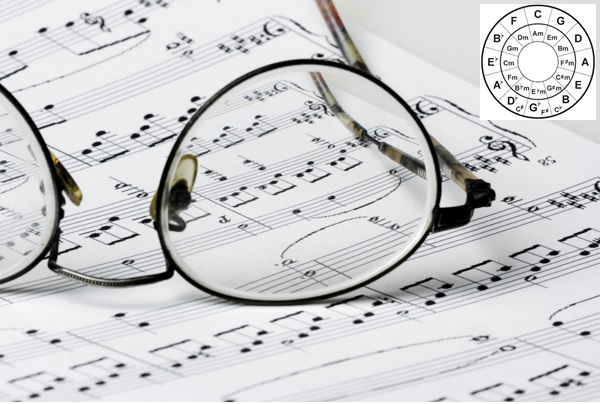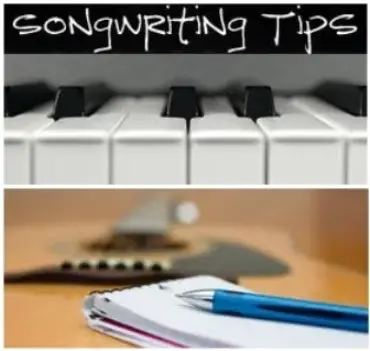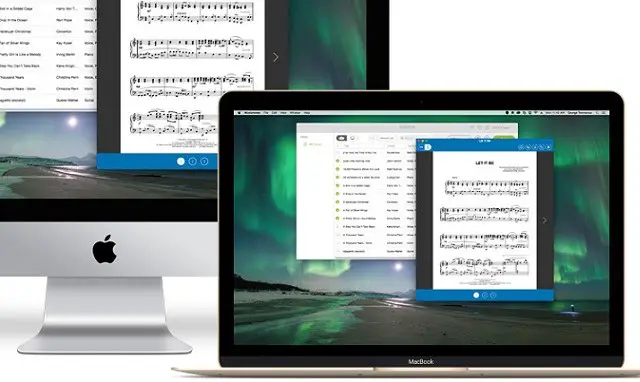
 Here are useful Songwriting tips & ideas to keep your creative juices flowing, and to add some freshness in your writing.
Here are useful Songwriting tips & ideas to keep your creative juices flowing, and to add some freshness in your writing.
Songwriters usually require the following skills (irrespective of the style):
- You need to create musical and lyrical ideas
- You need to arrange these ideas into formats that best suits the style of the song
In order to write a song, you need the following:
- Lyrics for the song
- Hummable melody
- Harmony (How to bring all the instruments together)
- Play it to your friends and family for feedback
You need an idea that is simple and connects with a large group of people. You need an infectious instrumental hook, good lyrics, chorus, anything can catch the listeners attention.
However, it can be challenge to write more, and at the same time keep the content fresh and not look repetitive.
How to Write a Good Song
If you are seriously fond of music, and can either sing or play a musical instrument, sooner or later you would want to start writing and creating your own songs.
It is indeed a great feeling to create something totally new and right from scratch.
Whether your songs will be liked by others or not depends on a lot of factors, and also there is no guarantee that just because you’re good at music theory means you will be able to roll out hit songs.
However, as a beginner to songwriting, you must be aware of the songwriting process, know the various song patterns, know about the characteristics of various music genres.
Various Approaches to Writing
A song could come up in your head from almost any angle.
If you’re listening to any song, or watching a movie and listening to the background score, or if you’re playing the guitar / piano. Many instrumentalists play some chord progressions and take it further from there.
Some play some bass lines or riffs, which gives them more ideas.
There are times, when you come up with a song just like that, and you get that feeling that the world needs to hear this one (Well, you’ll feel that about most of the songs that you create).
The songs that you come up with also depend a lot on your mood at that time. For many, it’s also a purposeful thought, it’s an expression that clicks, and also based on personal experiences lived, it’s who they are and what they want to be.
When you’re writing, don’t reject an idea by thinking that it is not good enough and so on. It shuts down your creativity process.
A better approach is to explore an idea completely and see how it evolves by using the ideas mentioned above. Allow yourself to create freely, without judging what you’re creating.
Follow the new ideas that pop into your head as you play with the first one. Do this for about an hour or so and you’ll find yourself brimming with musical possibilities.
This is a better approach compared to sitting with the intention of coming up with a great idea, and rejecting every other thing that pops into your head.
With experience obviously, writing songs will become a natural thing and you don’t have to refer to any song structure / chart when writing a Song.
Music Theory
You need to brush up on Theory such as writing the notes, fundamentals of musical pitch, time signature and so on.
Chord Progression & Patterns
Many songs have started with a catchy riff or chord progression, which was then developed into a complete song.
So even you can start with a chord progression (there are many from which you can choose) and expand the sequence into a song.
Create the Melody
You can then add a melody to your chord progression. There are many who do it the other way also, but then this is a popular way to create a song.
You can then combine the several melody notes into phrases, and the phrases into a complete song.
Music Arranging
There are many who get this done by other musicians who are good at arranging.
In case you want to do this on your own, you can learn to create the drums and bass tracks and then create other tracks of the song.
Popular Musical Forms
Any song consists of melody, lyrics, and chords that form part of the arrangement. There are various song structure that you can use, on which to base your song.
Here are some of the most common musical forms, on which most songs are based.
- Most songs either follow the verse-chorus form and usually include thirty-two bars form, but there are many that are also based on the twelve bar blues.
- Songs based on the Popular music genre are typically sectional, with several repeating forms.
- You may use (1) verse-chorus, verse-chorus-bridge, or (2) verse-verse-bridge-verse, or any other songwriting pattern.
Examples of some popular patterns include:
- Melody -> Chorus -> Bridge -> Melody (octave lower) -> Chorus -> Bridge -> Change up -> Chorus to End
- Intro -> Melody -> Chorus -> Melody (with embellishment) -> Chorus -> Change up -> Chorus -> Melody (octave higher) to end
So you may choose to structure your song in any of these forms.
Songwriting Tips
Here are some songwriting tips that will help you overcome this challenge:
- Write Your Experiences
This is also the comparatively easier to write, writing about your own experiences. You however need to think how to give it a global appeal.
- Use Catchy Phrases
You need to stay in tune with the times, so that you can use some of the phrases that people use every-day. For certain songs, you will need to write the lyrics the way people speak.
- Hook Your Listener
This one comes through experience and also by analyzing other works. The hook is what stays with the listener, and gets repeated over and over. So work on your hooks.
You also need to learn how to make a good first impression with the first line of your song.
- Listen More
Listen and analyze the hit songs, what are the things that make it so special? Try to incorporate the good things in your writing.
- Read More
Only then will you get more ideas. Not just newspapers, you also need to read some good song-writing books for more songwriting tips and ideas.
- Write More
That is the only way to improve, and also to make sure you have a good repository of songs ready with you.
- Rewrite your Songs
Every few months you should checkout your existing songs and try to rewrite or polish it further. With more experience, you can make these better.
- Keep a Recorder Handy
Get one if you don’t have one already. You may wake up with a brilliant, million dollar idea but could lose it if you don’t record it.
- Also Carry a Notebook
You need to note down all the ideas that you come across, and which you have decided to work on further. Some of the greatest hits have come out of a simple idea.
- Experiment
Otherwise things will get boring, and this is the best way to learn what works and what doesn’t. Using the same song-writing formula over and over could suffer from over-kill!
- Avoid forcing yourself to come up with ideas; it could turn out to be uninteresting. A better approach is to write whatever comes to your mind, and edit it later, or probably just take a break.
- Learn from Others
You can also learn from the success and failure of other songwriters & musicians.
Types of Software Used by Songwriters
More and more songwriters are moving away from pen and paper, and using songwriting software to pen down their feelings and to write beautiful songs. Despite the early skepticism about these software, more and more songs get written nowadays on the laptop computer.
Not only do these software keep all your songs organized at one place, they also include several other useful tools that aid in songwriting, such as rhyming dictionary, thesaurus, chord charts, and more.
When using these software, you also get an accompaniment band, which really helps you to get an idea of what your song is going to hear like.
If you use pen, you would already know that changing the key or adding an intro means starting all over.
So if you do this day in day out, you need to use a software so that it’s easy to change the keys, add more measures, and move things around. This will save you lot of time and also let your creative juices flow when you are in the middle of the work.
The best songwriter software actually lets you do a lot more then just songwriting – You can Write, Record, Edit, Mix, Master, Notate, Compose with these software.
Music Notation Software
 Music Notation software helps you easily create and print professional-quality sheet music.
Music Notation software helps you easily create and print professional-quality sheet music.
Writing music is a time consuming task, especially when you are not good at it. Even if you are good at it, writing complex arrangements takes lot of time.
Besides, if you write on a piece of paper, editing becomes a problem. It is not very convenient to keep on erasing and editing as you go on to develop your final score.
You can get rid of these issues by using a music notation software.
A Music Notation software can be useful for the classically trained composer to write music in the traditional way (using standard notation). Just play around with your musical ideas, and the software will give you the notation of the song that you composed right away.
The better ones provide you with all the features to help you compose a piece of music or create your own arrangement of a favorite song. These also have features for composing, arranging and publishing.
Best Music Notation Software:
- Notion: Compose any way you like and even enter music with your own handwriting
- Finale Print music: Create Sheet music with ease.
- Sibelius: Complete toolset to write, compose and arrange music without any limits
Lyric Writing Software
There are several software programs available to help you with your lyric writing.
These come with powerful writing tools that help you leverage the English language to the fullest so that you can express yourself in a more unique and meaningful way.
These are perfect for writing songs, poems, or even novels.
The best lyric writing software are comprehensive lyric writing tools that help you streamline every aspect of the creative writing process and can be of great help to the serious amateur or professional songwriter.
These provide features such as rhyming, phrases, alliterations, content-rich pop culture dictionary, organize the lines by syllables, and basically make the song easy to read.
Music Creation Software
These help you to create the actual song with various sounds/tracks. It requires you to have a computer and other equipment such as MIDI keyboard, recording software, audio interface, microphone, and other recording gear.
Most of the recording software are simple to use, and can be used to quickly record a couple of tracks such as a guitar/piano and vocals. Perfect if you want to capture basic singer songwriter type tracks.
You can also record complex music arrangements using this setup, but that requires advanced composing and arranging skills as well.
Read more on Music Recording Software.
Song Writing Journals, Music Composition Notebooks
Song Writing Journals, Music composition notebooks (Blank Sheet Music) for song writers, teachers and musicians.
Music composition notebooks with blank papers (for notes) and music manuscript paper (for writing notes, lyrics). The blank staff paper includes the five line staff.
These lined notation papers are perfect for composing, lyrics, songwriting, ideas and inspiration.
Who can use these?
- Write down lyrics and musical notation
- Keep track of all your song ideas
- Write your own songs
- Write notes from classes or lessons
Songwriting journals are a kind of notebooks that can be used to record ideas, snippets of lyrics, melodies, chord progressions, and other songwriting-related information.
Songwriting journals come with lined pages for lyrics, staffed pages for writing melodies, and fret diagrams for writing guitar fingerings.
These journals come in various sizes and are quite convenient to use, especially when inspiration strikes (instead of starting your laptop or tablet and opening some software).
Music Composition Notebook with Blank Sheet Music and Lined Paper
So no more writing notes on the back of manuscript pages or drawing staves on notebook pages. Use one of these song-writing journals, music composition notebooks with blank sheet music.
These blank music journals can be used by band students, musicians, composers, and song writers.
Music Songwriting Journal: Music journal with 8 x 10 pages. Lined pages on one side and blank sheet music on the other, allowing you to jot down lyrics and music. Good quality pages.
Songwriting Journal: 100 pages, Left hand pages contain 24 lines per page for writing song lyrics and ideas. The right hand pages contain 12 musical staves for writing down standard music notation.
Closing Thoughts
You should remember to follow your intuition, as most of the time it does take you in the right direction. At the same time, your mind may also want to judge each and every idea that you may come up with, which can take your focus OFF the writing part. The tips and ideas mentioned here will help you follow an effective approach while writing, and help you write a good song.
Also Read:
KeytarHQ editorial team includes musicians who write and review products for pianists, keyboardists, guitarists & other musicians. KeytarHQ is the best online resource for information on keyboards, pianos, synths, keytars, guitars and music gear for musicians of all abilities, ages and interests.



Leave a Reply